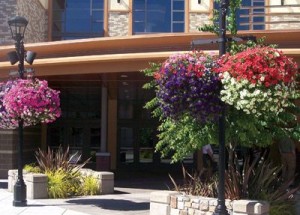Neighbors Concerned About Your Garden Store’s Runoff? How To Prevent A PR Nightmare

The Garden Corner in Tualatin, OR, supplies and maintains the community’s hanging baskets. Owner Jonn Karsseboom has learned how to answer concerns about how much water they receive.
In a perfect world, garden center retailers co-exist peacefully with all the residents in the surrounding neighborhood.
However, it isn’t a perfect world, and even in the best of scenarios trouble can arise. While garden retailers have created a business in the community, area residents have invested in their homes, which many times are the resident’s biggest financial asset. Any threat — perceived or real — can rally homeowners to action.
Garden centers can generate noise from traffic and delivery trucks. A poorly cared for retail establishment can look rundown and shabby, impacting property values. And an even bigger perceived problem is that you carry products like fertilizers and pest controls, which can produce unpleasant odors. Retailers also use these products on their display beds and retail plants. If improperly applied, this can result in runoff.
Build Trust Before A Problem Occurs
These are all worst-case scenarios that could result in homeowner or community action, of course, but even in the best of times it’s vital to have a good relationship with residents and business owners, says David Rourk, president of Rourk Public Relations in Virginia Beach, Va.
Despite best intentions, many times area residents can find fault with a local retailer over something that is perceived. Rourk suggests being proactive and having strong relationships to rely on before an issue even arises.
He says efforts like joining the local Civic League and creating strong ties to City Council and other local governmental agencies go a long way.
“Contribute to campaigns and drop a note to [civic leaders] every once in a while,” Rourk says. “Maybe start a small scholarship or support their little league teams, Cub scouts, etc. for (area) neighborhoods.
“It’s much harder to attack a business that’s liked. And if attacked, you’ve built up a nice list of allies who will come to your aid.”
How The Garden Corner Handled Neighborhood Concerns
Jonn Karsseboom, founder of The Garden Corner in Tualatin, Ore., says a consultant described his operation as so hidden that “you’ll only find this place if you’re completely lost.”
The properties on three sides of the garden center are designated single-family residential zoning; in other words, it’s surrounded by homes.
“A ship’s captain keeps one good eye on the horizon at all times,” Karsseboom says. While he maintains a great relationship with area residents, he has experience with negotiating rough waters.
He had two issues arise with the thousands of hanging baskets The Garden Corner distributes and maintains in the metro Portland area each year.
The first was fairly minor and fixable. “We have trucks — with people in them — that maintain these baskets daily. When we water, we use five gallons per basket, which means that when the truck actually leaves a basket and goes on to the next one down the road, the basket he just left leaks water for several minutes,” Karsseboom explains. “We’ve had residents (and drivers) call our garden center to ask why so much water is needed.
“The question, of course, comes at a time when the city just installed low water flow facilities and using less water had become a city mantra. So it made sense that not a week later I was called into a meeting with the officials to discuss the issue. Since then, we’ve developed a system of watering that has reduced water usage by nearly 50 percent.”
The next issue could have been a big one. City officials approached the garden center about phosphorus in the fertilizer for the hanging baskets after Lake Oswego experienced an algae bloom. But this time Karsseboom was ready.
“As a matter of fact, knowing our community, we’ve switched to an all organic liquid feed last year in further anticipation of concerns and questions,” he says. “I don’t like getting ‘caught’ on my heels when the time does come, and by keeping an eye on the horizon, I can possibly avoid any problems.”
Karsseboom provided written material to city officials, as well, when it was determined some of the baskets would need to be sprayed with a pesticide for geranium budworm.
Though the spray was all organic, Karsseboom gave officials all the information they would need anyway in case residents asked questions.
Rourk says being proactive is the key to success when working with local communities. But at the same time, you don’t have to overcommunicate if no one is complaining. Take, for example, the issue of runoff from fertilizing display gardens.
“There is no reason to be visibly proactive on runoff, if no one is complaining,” he says.
Talking To The Media
If a neighborhood problem results in homeowners mobilizing, most often the media gets involved. It is critical for a business to understand how to craft a message and work with the media to resolve the issue.
Rourk suggests having a damage control plan in place and drafting up communication points. The first step in creating a damage control plan is to identify the most damaging potential issues. Scan comments in the local news stories about anything remotely related to your products or store – topics like environmental issues, food safety or zoning.
The next step is to craft a plan to handle questions or concerns from media, government officials and neighborhood residents.
That plan will include having a list of messages it wishes to convey, or, in PR terms, communication points. Everyone should be familiar with these messages.
While all of the management team at the garden center should know the communication points, one person should be chosen as the spokesperson to the media — and the higher up the better.
“If the president does not do well with the media, identify another spokesperson,” he adds. “Whoever does the interview, whether print or TV, should have some media experience or have attended media training conducted by a PR professional.”
Rourk has more advice: “Do not pit your company against the neighborhood. Keep your statements positive; show you’re working with the neighborhoods. Show what changes you’ve made or are planning to make. Don’t get baited by a reporter to say something offensive.”
Bottom line? Keep the lines of communication open, act professionally and responsibly and stay out front with your message of working with the community. If the issue gets to the point of litigation, which sometimes happens, Rourk says to keep it professional. “Even through litigation, your media comments should remain respectful of your neighbors and stress how you are trying to work with them to solve the problem.”









